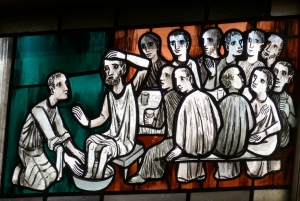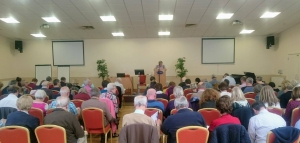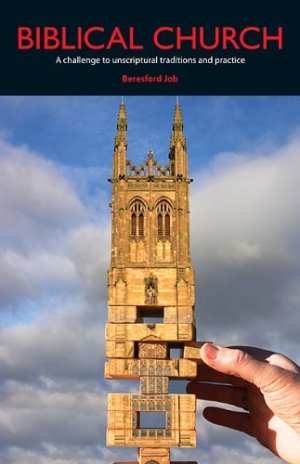General
Displaying items by tag: ekklesia
Prophecy: 'Walking on Water'
The Community of Believers (5)
The Community of Believers (4)
The Community of Believers (2)
The Community of Believers: Then and Now
Building Community
Reviews: Books on Churchless Christians
'Strengthen Weak Knees!'
Swanwick conference unites intercessors for Britain’s future
Earlier this week, over 100 watchmen and watchwomen from all around Britain gathered at The Hayes Conference Centre in Swanwick, Derbyshire, united by a fervent concern for the state of the nation and a desire to be strengthened in understanding, intercession and action.
The two-day conference of discussion, prayer, worship and seeking the Lord was not intended to be an overly structured event dependent on front-led sessions with leaders and experts, but was planned in such a way as to emphasise Body ministry and the unique contribution of each member of the ‘ekklesia’ of God.
Plenary sessions with corporate worship were led by Dr Clifford and Mrs Monica Hill and supported by the Issachar Ministries and Prophecy Today UK teams. Prophetic songs were brought and each morning the shofar was blown. But the richness and depth of the gathering was really established in smaller groups, where time was spent praying together and sharing wisdom and insight.
Surprise Speakers
Surprise additional speakers were Andrea Williams of Christian Concern and Syd Doyle of Nations Light Ministries. Andrea updated those present on the state of the nation, forthcoming legislation and current issues facing Christians in the workplace. Apparently, the Christian Legal Centre are dealing with four or five new enquiries each week from Christians regarding workplace issues.
 Andrea Williams speaking at The Hayes, Tuesday 19 March 2019. Photo: Prophecy Today UKShe also agreed with Clifford and Monica Hill that Christians are “living in Babylon” and that believers will need to begin to form their own businesses and schools to provide employment and education, which will provide safe environments for them and their children. Chiming with this assessment, the Hills’ Living in Babylon book and workbook were recommended particularly as a resource for prayer and study groups.
Andrea Williams speaking at The Hayes, Tuesday 19 March 2019. Photo: Prophecy Today UKShe also agreed with Clifford and Monica Hill that Christians are “living in Babylon” and that believers will need to begin to form their own businesses and schools to provide employment and education, which will provide safe environments for them and their children. Chiming with this assessment, the Hills’ Living in Babylon book and workbook were recommended particularly as a resource for prayer and study groups.
Syd Doyle encouraged conference with exciting stories of outreach to Muslims and others in various places. He was also moved and encouraged to hear Clifford’s word about the “jewel in the crown” role of the DUP in the Brexit negotiations, full details of which are in our Editorial this week and have been sent in a letter to the Prime Minister.
Perhaps most importantly, time was set aside to seek the Lord in quietness, after which prophetic words and pictures that had been received were shared with the whole group. It was during this session that Clifford received the word about the spiritual significance of the DUP.
Though the programme was a full one, time was made for fellowship over coffee and meals, allowing those present to establish and strengthen their own personal connections. Clifford and Monica took the opportunity to reminisce with stories about their 50 years of ministry, some of which appear in The Reshaping of Britain. One story that didn’t make it into Clifford’s latest book was his and Monica’s first meeting, over 60 years ago – on a tennis court at The Hayes Conference Centre!
A Way-marker
As the time progressed, the sense of the Lord’s presence and leading seemed to become more palpable. Those who came expecting quick-fix answers to the national situation will have been disappointed, as the long-term, complex nature of our spiritual battle was brought into view and the responsibility of each individual to seek the Lord for their own understanding and response was emphasised. This was not a gathering to hype up expectations of revival (which will not come without repentance in any case, as Clifford pointed out) – but collectively to face up to reality and “strengthen feeble arms and weak knees” for the task ahead (Isa 35:5; Heb 12:12), putting all things in the context of the nature and purposes of God.
As such, it was not an end-point or a culmination, but a starting-point for some and a way-marker for others. Some found Dr Hill’s session on Jeremiah 30-31 especially significant, as a way into developing our understanding of how Brexit and God’s plans for Britain might fit into his overarching covenant plans for Israel and his purposes for the whole world.
Others were inspired particularly by Andrea Williams speaking about the socio-cultural and political battles being fought in the nation – the worldly face of our underlying spiritual conflict. Still others were galvanised by Syd Doyle reminding us of our collective responsibility to make disciples, including amongst Muslims – “the fields are white for harvest” (John 4:35).
We trust that the Holy Spirit will have reached and ministered to each delegate in a unique and special way. Each person was encouraged to think about how they could develop their own witness and ministry in their area, in unity with other believers. It is hoped that in the future, Issachar Ministries will be able to play a part in connecting up believers locally.
Review: Biblical Church
Paul Luckraft reviews ‘Biblical Church’ by Beresford Job (Bethany Publishing, 2007).
This excellent book challenges the traditional way that Christians do ‘church’, and explains what should be in place instead. The author aims to show that the church-going practices Christians generally observe are based upon teachings that have little or nothing to do with the Bible. Rather, they originated with men who led the Church after the Apostles were dead and the writings of the New Testament had been completed.
Though now over ten years old, this remains another useful resource for Christians who are currently ‘out of church’ – or who are seeking to rethink their current approach to church.
Delving into Ecclesiastical History
The book is in three parts. The first, called Traditions, starts by reviewing the Jewish ‘traditions of the elders’, which Jesus opposed. The author draws heavily on the teaching of others in these early chapters and the material may be familiar to many, but it forms a necessary background to his argument: that we have made the same mistakes, by building our own church traditions.
In chapters 4 and 5, Job looks in detail at the traditions of the early ‘Church Fathers’. He focuses on six from the two centuries after the Apostles: Clement of Rome, Ignatius, Justin Martyr, Irenaeus, Tertullian, and Cyprian of Carthage. Job is clear that they didn’t get everything wrong; in fact, he praises them for spreading the good news and preserving the truth of the Gospel in the face of heresy. For this they deserve honour and respect.
But Job does take issue with the church practices they introduced, which stemmed from a fundamental flaw regarding leadership. By introducing a clergy/laity divide, they created a new priesthood and layers of hierarchy which led to further errors.
This new system of ecclesiastical power and authority made it inevitable that any teachings introduced from the top would be readily accepted - whether in line with Scripture or not. In time, without the necessary input from Scripture, it was unavoidable that the Church would morph into a human organisation you could join, rather than a living organism - Christ’s Body.
Job traces how over several centuries, the Church morphed from a living organism – Christ’s Body – into a human organisation.
Job’s revealing analysis of modern-day church is summarised helpfully with a ‘Not-To-Do’ list: things which believers unquestioningly accept but which actively go against Scripture (p100).
In Chapter 8, he considers common objections to his argument: God still seems to bless such churches. The Holy Spirit is still at work. So why cause trouble and upset people? Here the author offers an honest assessment of these questions, but remains adamant that the status quo means we are missing out on God’s best!
Discovering Biblical Church
Part Two, entitled Biblical Church, is more positive in outlook and considers in detail what biblical church should look like. The author repeatedly stresses that he is not drawing a contrast between true and false churches, but between biblical and unbiblical practices.
He highlights four key areas that, for him, make up the minimum for a biblical church:
- Leadership should reflect that in Acts, with elders as overseers, not a ruling hierarchy;
- Home meetings are best for developing fellowship and deep relationships;
- Worship should be led by the Spirit and reflect the unity of the Body of Christ, and
- The Lord’s Supper should be celebrated with a proper meal, not just a quick snack of tokens.
Like Steve Maltz’s work on Hebraic church, Job emphasises function over form. Get the function right and the correct form of church practice will emerge.
Job acknowledges that biblical churches are not guaranteed to be problem-free. They can still be unloving or undisciplined. But if they have the right ‘shape’ then there is greater opportunity for the Lord to change people.
The author closes Part Two with a chapter entitled ‘What the Experts Say’. He wants to show that all he has been proposing is not just his opinion but is backed up by theologians.
The author repeatedly stresses that he is not drawing a contrast between true and false churches, but between biblical and unbiblical practices.
What to Do?
Part Three brings something new and special to the growing debate on ‘out of church’ Christianity: If you do want to change, how do you go about it?
Job offers many pieces of good advice and some sound ground-rules, drawing on his own experience and testimony. For those who end up leaving their current churches, he insists there is no need for unpleasantness and advises on how to leave peacefully, retaining bonds of fellowship with those who remain. He also stresses that changing to meeting in a home may not itself be the answer – and that any attempt to start up a new form of church should be preceded by and birthed in prayer. Seeking the Lord, and asking what he wants, is vital.
Job is down-to-earth and practical, not romantic: he explains that for Christians wanting to pursue radical transformation in their church practice, it is important to take it slowly and learn to walk before you can run, learning to listen to others and growing in patience.
His list of ‘Dos and Don’ts’ is particular useful, as are his FAQs and chapter of advice on how to look for outside help (however, despite its good general suggestions this has been removed from the Kindle version since its mentions of specific people are now out of date). The key, he suggests, is to seek out those with maturity and a strong sense of morality: just being well-meaning or having a ‘ministry’ may not be enough to guarantee a good start-up or later growth.
This book is a worthwhile addition to the growing literature on ‘alternative’ forms of church that seek greater fidelity to Scripture. Nobody is claiming to have published the final word on this issue, but this book will undoubtedly be a worthwhile, thought-provoking addition to the shelves of anyone in a quandary over it.
‘Biblical Church’ (288 pages, paperback) is available from Amazon for £8.96. Also on Amazon Kindle. Find out more at www.house-church.org.












